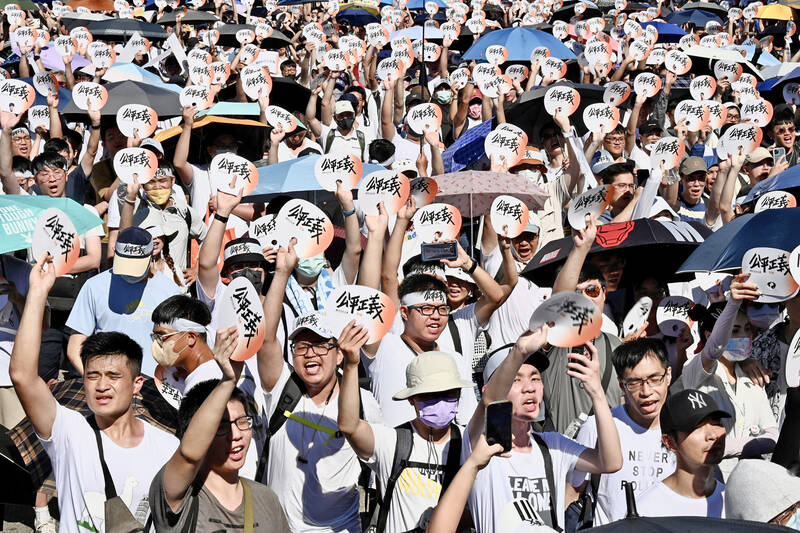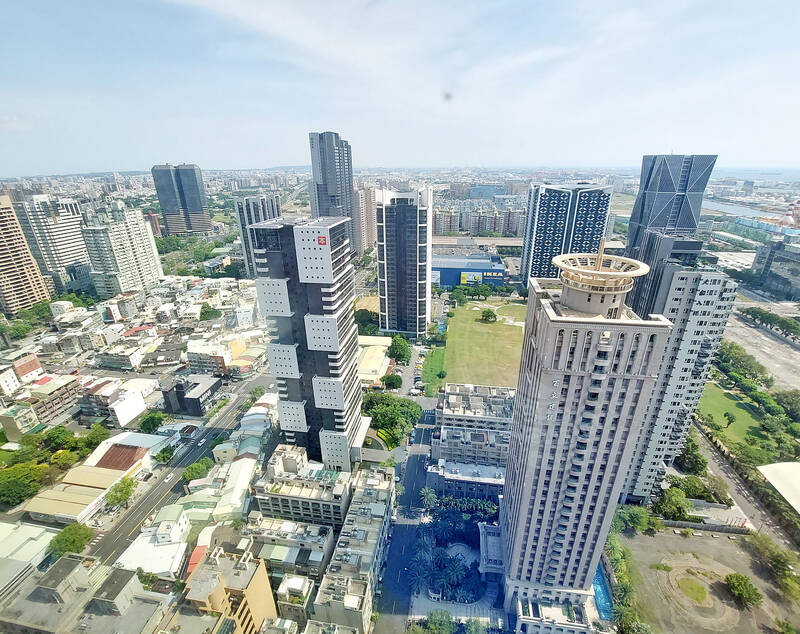In the recent presidential election campaign, Sarah Liu and Liu Li-yin cited statistics from Taiwan Election and Democratization Study in a piece at The Conversation, noting that 63 percent of college-educated men favored Taiwan People’s Party (TPP) candidate Ko Wen-je (蔡英文), against only 49 percent of college-educated women.
“Among those aged between 30 and 39 years,” they observed, “men favored Ko to a significantly greater degree than women.”
At the Housing Justice rally last year, a woman held up a placard citing sexist remarks made by Ko. He called the protest “mudslinging” and asked what it had to do with him. His followers on the internet, led by influencer Holger Chen (陳之漢), a former gang member turned celebrity known for misogynistic commentary and performative hypermasculinity, attacked the woman. The rally itself was neatly summed up by TaiwanPlus News, which stated: “Tens of thousands, most of them young Taiwanese men, rallied in Taipei on Sunday calling for housing justice and judicial reform.”

Photo: Peter Lo, Taipei Times
Note the linkages between right-leaning males, misogynistic masculinity and the housing crisis.
Chinese Nationalist Party (KMT) candidate Hou You-yi (侯友宜) is no stranger to such comments. Liu and Liu cited his 2018 remarks on a ride sharing program that Hou said would allow men like him to make friends with young women.
In 2020, KMT presidential candidate Han Kuo-yu (韓國瑜) became notorious for blatant sexism. It is easy to pick on the KMT and the TPP, but it should not be forgotten that Democratic Progressive Party (DPP) candidate William Lai (賴清德) mounted a sudden primary challenge in 2020 to then-president Tsai Ing-wen (蔡英文) of his own party, a challenge spurred by the machinations of a cabal of old reactionaries within the DPP who themselves are crusty old misogynists. Throughout her presidency misogyny was an element of the attacks on Tsai.

Photo: Hou Cheng-hsu, Taipei Times
During the election the shift of women away from Ko was noted by all observers, and his misogyny was offered as the explanation. But as Liu and Liu wrote, women were unhappy with all three candidates, none of whom could be described as progressive, despite one party having that term in its name. Were they manifesting another global trend?
I have written elsewhere of the changes in society that have left so many of Taiwan’s young males in unproductive, precarious jobs (“Taiwan’s young men adrift,” Oct. 2, last year). But Taiwan may well be following a broader global trend, one that is sending younger males off to the right, while women shift to the left. This trend is linked to two other trends: the global housing crisis and the rise of TikTok as an information source for the young.
In Europe, according to a May report from Politico, many young men are trending towards the right. In Netherlands and Portugal right-wing parties ran on platforms featuring anti-immigration and housing issues, and drew support from young males. A Euronews piece on support for the right among the young cited Andrea Gerosa, founder of the Think Young think tank: “Today’s youth are unhappier than older generations,” feeling that “mainstream parties have failed to deliver on social issues.”
Similar complaints were widespread in the last two elections in Taiwan.
An interesting Reuters report discussed a large survey of Americans between 2014 and last year quoted Martijn Lampert, head of research at Glocalities, the organization that conducted the poll. He noted that young people the world over feel especially let down by society.
“Globally, young women are likely the most liberal group in human history,” the report said, contrasting women with the rightward shift among many males.
In East Asia the shocking misogyny among South Korean males has become a global news item. A 2022 piece at East Asia Forum (EAF) listed some sobering statistics: more than half of all homicides involve female victims, while 90 percent of violent crime victims in 2019 were female. Women are routinely filmed in locker rooms, bathrooms, stores and subways, and the imagery spread online. A 2017 Human Rights Watch survey saw 80 percent of men admit to violence against an intimate partner.
According to the piece, “young, educated and tech-savvy men have been the main drivers of misogyny and hate speech against women online.”
In Taiwan that is the group that shifted support from the DPP to Ko Wen-je in January’s presidential election. In South Korea this group “blames women and feminism for its economic and social difficulties.” These difficulties will be recognizable to anyone familiar with Taiwan: housing prices and income inequality. A Harvard Political Review article similarly observes: “Marking a dramatic populist shift, young men have redirected their growing economic frustration by scapegoating women as the new out-group responsible for these issues.”
Reflecting the global pattern, the EAF article observes that recent surveys show that in Korea 76 percent of men in their 20s oppose feminism, while 64 per cent of women in their 20s support feminism.
In Taiwan immigration is not yet an issue, either as a possible palliative for the nation’s urgent problems, or as a punching bag for governmental failure. Yet, the disparate piles of data from elsewhere tend to suggest that if Taiwan starts importing the people it needs to continue to function as a nation, the new immigrants will take the blame for government failures. This will be followed by a marked rightward shift among young males that will make them vulnerable to populist politicians. That is what has happened across Europe. In the US, the Trumpian right has become virulently anti-immigrant.
In Europe the rightward swing and general disaffection among the young has the same roots as in Taiwan: the housing crisis. A recent Guardian piece on the housing crisis and the young cited data from Ireland showing that between 2017 and 2022, “the proportion of working 25 to 34-year-olds living with their parents rose from 27 percent to 40 percent” as rents skyrocket. Similar numbers are seen across Europe.
In Taiwan it is normal for young people to live with parents, which may be defusing that particular bomb. But rents are now rising around Taiwan. According to the Directorate General of Budget, Accounting and Statistics (DGBAS), rents are rising over 2 percent annually, double the historical rate, thanks to rising maintenance costs, the Russian invasion of Ukraine and COVID-19. We can expect rents to continue to rise.
All the pieces of the “polycrisis” afflicting Europe exist here in Taiwan in larval form. Taiwan needs are clear: if the government wants to stop young males from swinging over to Ko and similar rightist politicians, it needs to meaningfully address the housing price issue. If the government wants to increase youth buy-in to social change and progress in Taiwan, it needs to get rents under control.
Housing, housing, housing needs to be the Lai administration mantra.
Notes from Central Taiwan is a column written by long-term resident Michael Turton, who provides incisive commentary informed by three decades of living in and writing about his adoptive country. The views expressed here are his own.

The Democratic Progressive Party (DPP), Chinese Nationalist Party (KMT), and the country’s other political groups dare not offend religious groups, says Chen Lih-ming (陳立民), founder of the Taiwan Anti-Religion Alliance (台灣反宗教者聯盟). “It’s the same in other democracies, of course, but because political struggles in Taiwan are extraordinarily fierce, you’ll see candidates visiting several temples each day ahead of elections. That adds impetus to religion here,” says the retired college lecturer. In Japan’s most recent election, the Liberal Democratic Party lost many votes because of its ties to the Unification Church (“the Moonies”). Chen contrasts the progress made by anti-religion movements in

Taiwan doesn’t have a lot of railways, but its network has plenty of history. The government-owned entity that last year became the Taiwan Railway Corp (TRC) has been operating trains since 1891. During the 1895-1945 period of Japanese rule, the colonial government made huge investments in rail infrastructure. The northern port city of Keelung was connected to Kaohsiung in the south. New lines appeared in Pingtung, Yilan and the Hualien-Taitung region. Railway enthusiasts exploring Taiwan will find plenty to amuse themselves. Taipei will soon gain its second rail-themed museum. Elsewhere there’s a number of endearing branch lines and rolling-stock collections, some

Last week the State Department made several small changes to its Web information on Taiwan. First, it removed a statement saying that the US “does not support Taiwan independence.” The current statement now reads: “We oppose any unilateral changes to the status quo from either side. We expect cross-strait differences to be resolved by peaceful means, free from coercion, in a manner acceptable to the people on both sides of the Strait.” In 2022 the administration of Joe Biden also removed that verbiage, but after a month of pressure from the People’s Republic of China (PRC), reinstated it. The American

Chinese Nationalist Party (KMT) legislative caucus convener Fu Kun-chi (傅?萁) and some in the deep blue camp seem determined to ensure many of the recall campaigns against their lawmakers succeed. Widely known as the “King of Hualien,” Fu also appears to have become the king of the KMT. In theory, Legislative Speaker Han Kuo-yu (韓國瑜) outranks him, but Han is supposed to be even-handed in negotiations between party caucuses — the Democratic Progressive Party (DPP) says he is not — and Fu has been outright ignoring Han. Party Chairman Eric Chu (朱立倫) isn’t taking the lead on anything while Fu